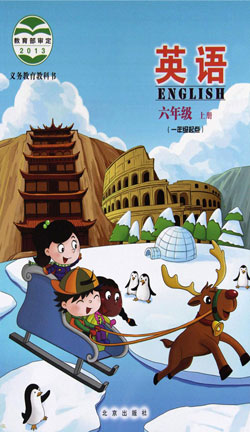Lesson 13课文原文、中英文对照及听力音频听读
UNIT FOUR REVISION - 北京版英语六年级上册
UNIT FOUR REVISION 翻译:第四单元 复习
Lesson 13 翻译:第十三课
Do you understand? 翻译:你听懂了吗?
Tick (✓) or cross (×). 翻译:打勾(✓)或打叉(×)。
Can you talk? 翻译:你会说吗?
The girl has a bad toothache. 翻译:这个女孩牙疼得厉害。
cake 翻译:蛋糕
candy 翻译:糖果
chocolate 翻译:巧克力
The boy hurt his legs. 翻译:这个男孩弄伤了他的腿。
bike 翻译:自行车
fall off 翻译:从……上面摔下来;跌落
Can you write? 翻译:你会写吗?
Follow the example and complete the sentences. 翻译:仿照例句,完成这些句子。
E.g. I did my homework yesterday. 翻译:例如,我昨天做了家庭作业。
I do my homework every day. 翻译:我每天做家庭作业。
I will do my homework tomorrow. 翻译:我明天要做家庭作业。
She went shopping last week. 翻译:她上周去购物了。
She goes shopping every week. 翻译:她每周都去购物。
She will go shopping next week. 翻译:她下周将去购物。
They went to the cinema last month. 翻译:他们上个月去看电影了。
They go to the cinema every month. 翻译:他们每个月都去看电影。
They will go to the cinema next month. 翻译:他们下个月将去看电影。
She went to the beach last year. 翻译:她去年去海边了。
She goes to the beach every year. 翻译:她每年都去海边。
She will go to the beach next year. 翻译:她明年将去海边。
Can you do? 翻译:你会做吗?
Yesterday, I played football. 翻译:昨天,我踢足球了。
Yesterday, he played football. 翻译:昨天,他踢足球了。
I went swimming. 翻译:我去游泳了。
Yesterday, he played football. 翻译:昨天,他踢足球了。
She went swimming. 翻译:她去游泳了。
I watched TV. 翻译:我看电视了。
Lesson 13 翻译:第十三课
Can you read and write? 翻译:你会读会写吗?
The compass, gunpowder, papermaking, and printing are the four great inventions of ancient China. 翻译:指南针、火药、造纸术和印刷术是中国古代的四大发明。
The Compass 翻译:指南针
The earliest compass appeared in the 4th century BC. 翻译:最早的指南针出现在公元前4世纪。
Then during the Song Dynasty people used this magnetic device to show the direction of south. 翻译:然后在宋朝时期,人们就利用这种磁性器件来指示南方。
They used an iron "fish" in a bowl of water and this "fish" could point south. 翻译:他们将一个铁制的“指南鱼”放在一碗水中使用,然后这个“指南鱼”就能指向南方。
Later, they made dry compasses. 翻译:后来,他们就制造了干罗盘。
Gunpowder 翻译:火药
The Chinese people discovered gunpowder in the 9th century when they were searching for something that could help them live longer. 翻译:中国人在9世纪发现了火药,当时他们正在寻找能够帮助他们长寿的东西。
Later, people used gunpowder to make fireworks. 翻译:后来,人们就利用火药来制造烟火。
People in the West began to use gunpowder in war. 翻译:西方人则开始将火药用于战争当中。
Papermaking 翻译:造纸术
Papermaking dates back to very ancient times in China. 翻译:造纸术要追溯到中国的远古时期。
Cai Lun of the Han Dynasty improved the papermaking process. 翻译:汉朝的蔡伦改进了造纸术的过程。
He used silk, fibre, fishnets, and many other things to make paper. 翻译:他利用蚕丝、纤维、鱼网和许多其他材料来造纸。
From the 3rd century onwards, people began to use paper for writing. 翻译:从3世纪起,人们就开始用纸来写字。
Printing 翻译:印刷术
The Chinese people began to use woodblock printing as early as the 3rd century. 翻译:早在3世纪,中国人就开始使用雕版印刷术。
Many years later, Bi Sheng invented a ceramic movable type of printing. 翻译:许多年后,毕昇发明了一种陶质的活字印刷术。
Later, people used other movable types of printing such as wooden and metal types. 翻译:后来,人们还利用了其他的活字印刷术,例如木制和金属制等类型。
Task 1 翻译:任务 1
Tick (✓) or cross (×). 翻译:打勾(✓)或打叉(×)。
The earliest compass appeared during the 4th century BC. 翻译:最早的指南针出现在公元前4世纪期间。
The earliest compass was the dry compass. 翻译:最早的指南针是干罗盘。
People in the West started to use gunpowder in war. 翻译:西方人开始将火药用于战争当中。
From the 2nd century, people began to use paper for writing. 翻译:从2世纪起,人们就开始用纸来写字。
Cai Lun invented the movable type method of printing. 翻译:蔡伦发明了活字印刷术。
At first, the Chinese people used woodblock printing. 翻译:起初,中国人使用的是雕版印刷术。
Task 2 翻译:任务 2
Correct the wrong statements in Task 1 and write down the correct ones. 翻译:将任务1中的那些错误陈述进行纠正,并写下正确的陈述。
Lesson 13 翻译:第十三课
英语北京版六年级上册课文目录
- Lesson 13
- Lesson 14
最新学习记录 更新时间:2026-02-10 02:28:22



 切换教材
切换教材